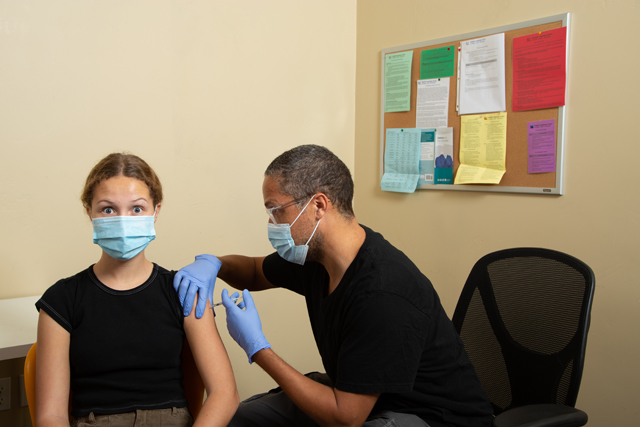
Financial Incentives Can Reduce Vaccine Hesitancy, but only in Large Amounts
A reward of $500 increases vaccine willingness by 15 to 20 percent, reveals a new UC San Diego study
Published Date
By:
- Christine Clark
Share This:
Article Content
Willingness to vaccinate is critical in overcoming the COVID-19 pandemic. About 45 percent of Americans are not vaccinated and among those vaccinated, less than 30 percent have received a booster. Financial incentives and other nudges have been used to help increase vaccination rates across the nation, but new research from the University of California San Diego’s Rady School of Management reveals that compensations need to be large—at least $100—to reduce vaccine hesitancy.
The study, to be published in the journal Management Science, shows that low monetary compensations of $10 or $20 can backfire and reduce vaccine intentions, compared to no compensation at all.
“The backfire effect of small compensations was especially prevalent among those who are skeptical of vaccines,” said study co-author, Marta Serra-Garcia, associate professor of economics and strategy at the Rady School. “It could be seen as a price tag by people and a low price may indicate the item is not of good quality.”
Consistent with related evidence, the study finds that participants politically aligned with former President Trump reported to be more vaccine hesitant, citing a lack of trust in the newly created inoculation.
Employers using compensations to incentivize employees to become vaccinated include hospitals, telecommunications and train companies, restaurants as well as supermarket chains. These incentives vary from amounts such as $25, going up to $750 in some companies, or much larger lottery prizes offered by local governments of some cities and states in the U.S.
The UC San Diego study finds a $100 compensation increases vaccine intentions by 4.5 percent, whereas a $20 compensation decreases intentions by 5 percent, relative to no compensation at all. The largest incentive of $500 increases support by about 15 to 20 percent.
“If prevention of infection and outbreaks is a major goal, this investment can pay for itself,” Serra-Garcia said. “For some employers, like nursing homes or hospitals, the increase in vaccination rates may be crucial to save many lives. Moreover, for many other businesses, such as factories, it may be fundamental to avoid larger outbreaks, in order to stay economically healthy.”
The study also measured the efficacy of nudges, such as pre-scheduled vaccine appointments. These increase vaccine intentions by five to six percentage points.
“In areas where support for the vaccine is low, due to a lack of trust, prescheduled appointments and compensations of at least $100 could be effective in increasing vaccine take-up,” Serra-Garcia said.
The study took place from December 2020 to February 2021 and surveyed 1,544 ethnically diverse participants across the U.S. There were two rounds of data collection among the respondents.
The study was conducted at a time when a large majority of people did not yet have access to COVID-19 the vaccines, so the surveys could not measure actual decisions. However, the results have important implications for businesses and governments.
“This pandemic will likely not be the last one within the next decades,” Serra-Garcia said. “Additionally, the multiple COVID-19 variants continue underscore the importance to understanding how to motivate people to take up preventative measures, such as vaccination.”
Share This:
You May Also Like
Stay in the Know
Keep up with all the latest from UC San Diego. Subscribe to the newsletter today.



